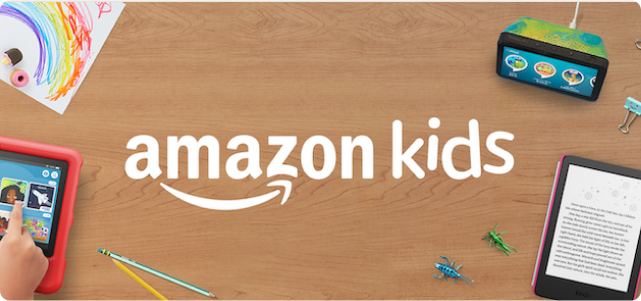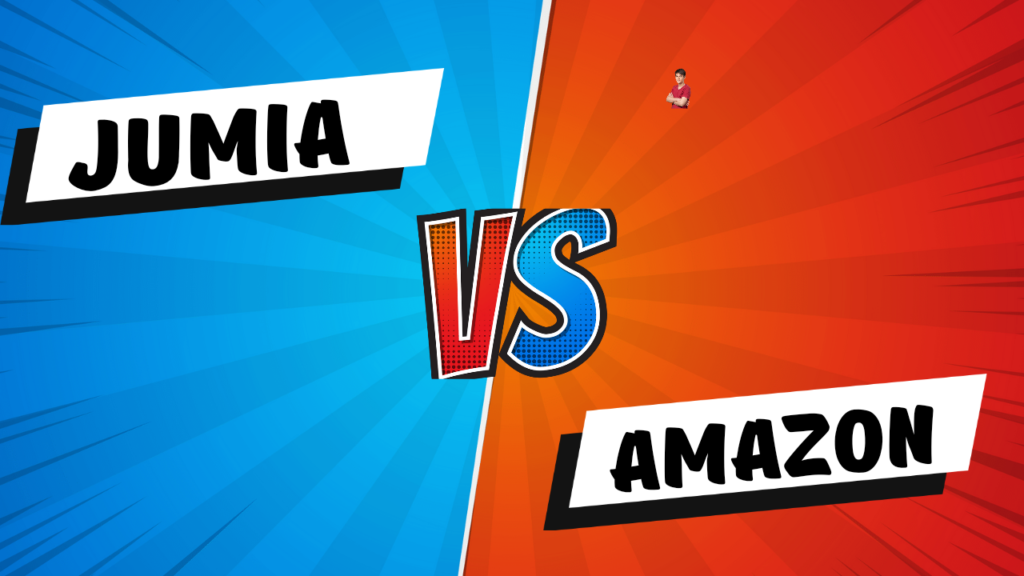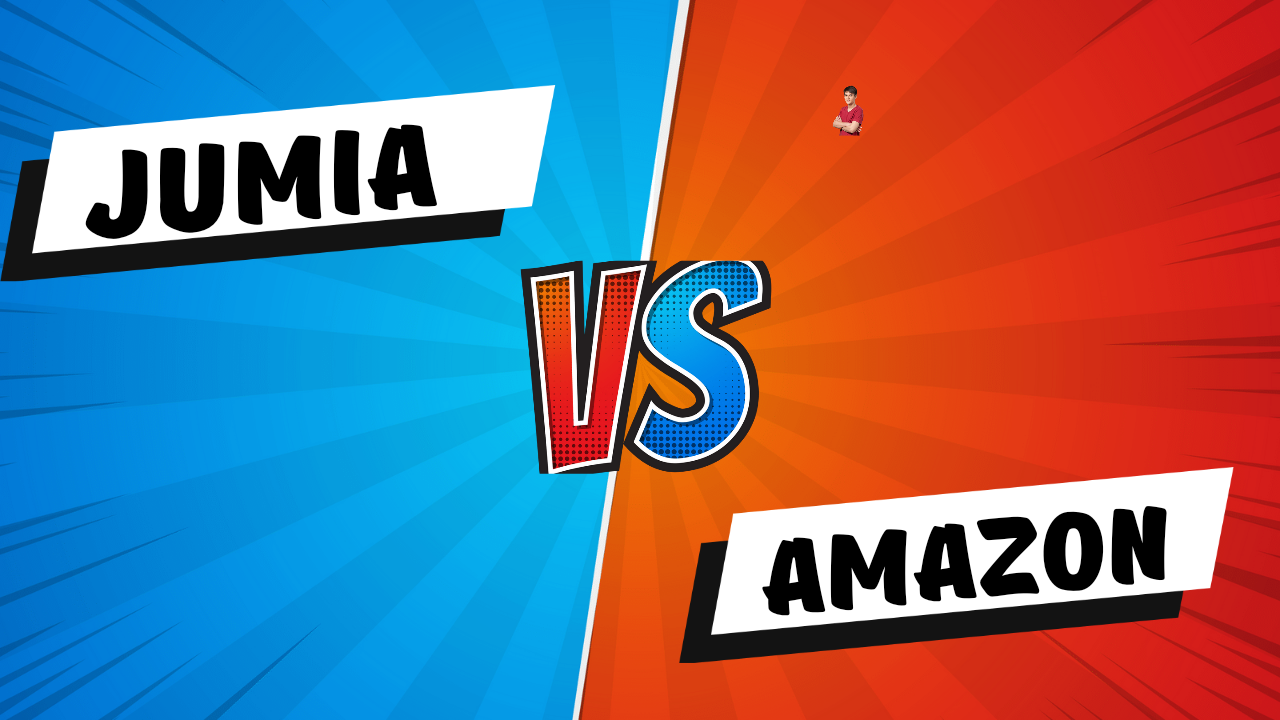Introduction:
Amazon vs Jumia: Which Is Better for You? iIs a review that we give you comprehensive knowledge that helps to a decision. Online shopping has changed the way we buy things. Instead of going to physical stores, we can now get almost anything we want with just a few clicks.
But with so many e-commerce platforms available, choosing where to shop can be a bit overwhelming. Today, we’ll be comparing two of the biggest online shopping giants: Jumia and Amazon. If you’re wondering which platform is better for you, you’re in the right place!
Whether you’re a regular online shopper or just starting, this review will help you decide whether Jumia or Amazon is your go-to shopping destination in 2024. We’ll break down the differences between the two, look at their strengths and weaknesses, and highlight the features that matter most to you.

The Basics: What Are Jumia and Amazon?
Before diving into the nitty-gritty, let’s start with the basics.
Jumia is an African e-commerce platform hugely popular in countries like Nigeria, Kenya, Egypt, and others. Launched in 2012, Jumia has become a household name in many parts of Africa, offering a wide range of products, from electronics to groceries. It’s often referred to as the “Amazon of Africa.”
Amazon, on the other hand, needs no introduction. Founded by Jeff Bezos in 1994, Amazon has grown into a global e-commerce powerhouse. It operates in many countries, including the United States, the UK, India, and even some African countries. Amazon offers almost everything under the sun, including books, electronics, clothing, and even groceries.
Now that you have a basic understanding of both platforms, let’s dig a little deeper.
Product Range: Who Has More Variety?
When it comes to variety, both Jumia and Amazon have a lot to offer. But how do they compare?
Amazon: It’s no secret that Amazon has an almost endless range of products. Whether you’re looking for the latest iPhone, a rare book, or even a robot vacuum cleaner, Amazon probably has it. The platform caters to a global audience, which means you can find products from all over the world. Amazon also offers a variety of services, like Amazon Prime, which gives you access to streaming, fast delivery, and exclusive deals.
Jumia: Jumia also has a broad range of products, but it’s more focused on the African market. You can find electronics, fashion, home appliances, and even groceries. One unique feature of Jumia is Jumia Food, a service that allows you to order food from local restaurants and have it delivered to your doorstep. While Jumia doesn’t offer as many niche products as Amazon, it’s a great platform for everyday items.
Which Is Better?
If you’re looking for global variety and niche products, Amazon wins. However, if you need everyday items and local services in Africa, Jumia is the way to go.

Prices: Where Can You Get the Best Deals?
We all love a good bargain, right? So, let’s talk about prices.
Amazon: Amazon is known for competitive pricing, especially during sales events like Black Friday, Cyber Monday, and Prime Day. However, because Amazon is a global platform, shipping fees and import duties can make certain items more expensive for African buyers. If you’re in the US or Europe, Amazon’s prices can be very attractive, but for African shoppers, it’s a mixed bag.
Jumia: Jumia offers prices tailored to the African market, which often means you can get items at a lower cost compared to Amazon. Plus, Jumia frequently has promotions, flash sales, and discounts. You’ll also save on shipping, as many items are sourced locally. However, it’s essential to compare prices, as some sellers might mark up products.
Which is better?
If you’re shopping from Africa, Jumia usually offers better prices and lower shipping costs. However, for those in the US, Europe, or other regions where Amazon has a strong presence, Amazon’s prices, especially during sales, can be unbeatable.

Delivery Speed: Who’s Faster?
We’ve all been there—waiting for a package and refreshing the tracking page every hour. Delivery speed is a big deal, so let’s see how Jumia and Amazon stack up.
Amazon: Amazon’s delivery speed is legendary, especially if you’re an Amazon Prime member. In some locations, you can get same-day or next-day delivery. However, if you’re ordering from Amazon and live in Africa, delivery times can be longer due to international shipping.
Jumia: Since Jumia operates locally in many African countries, delivery times are usually fast, especially for items that are in stock locally. Jumia Express offers quicker delivery options, and you can often receive your order within a few days. If you’re in a major city like Lagos or Nairobi, delivery is even faster.
Which Is Better?
For African shoppers, Jumia wins in terms of delivery speed. If you’re outside Africa and have Amazon Prime, Amazon takes the lead.

Customer Service: Who’s Got Your Back?
Customer service can make or break your shopping experience. So, how do Jumia and Amazon fare?
Amazon: Amazon is known for excellent customer service. They have a straightforward return policy, and refunds are usually processed quickly. If you have a problem with your order, Amazon’s customer service is available 24/7 via chat, email, or phone. They also have a reputation for going above and beyond to resolve issues.
Jumia: Jumia’s customer service is decent but can be hit or miss. The platform offers multiple ways to contact customer support, including live chat, email, and phone. However, response times can vary, and some customers have reported issues with returns and refunds. On the bright side, Jumia’s Pay on Delivery option gives you peace of mind—you can inspect the item before paying.
Which Is Better?
Amazon generally offers more reliable and responsive customer service. However, Jumia’s Pay on Delivery is a great feature for those who want to avoid potential issues.

Payment Options: Which Platform Is More Flexible?
In today’s world, flexibility in payment options is crucial. Let’s see how Jumia and Amazon compare.
Amazon: Amazon accepts a wide range of payment methods, including credit cards, debit cards, and Amazon gift cards. In some regions, you can even use services like Apple Pay and PayPal. However, if you’re in Africa, you might find it challenging to use local payment methods.
Jumia: Jumia shines in this area for African shoppers. The platform accepts various payment methods, including mobile money, bank transfers, and even cash on delivery. This flexibility makes it easier for people in regions where credit card usage is low to shop online.
Which Is Better?
For African shoppers, Jumia’s payment options are more diverse and accessible. For global customers, Amazon offers more options but might not be as convenient for African users.
Product Authenticity: Are You Getting the Real Deal?
No one wants to end up with a fake product. So, how do Jumia and Amazon ensure authenticity?
Amazon: Amazon has a vast marketplace with millions of sellers, which is both a strength and a weakness. While you can find authentic products from trusted brands, the platform also has issues with counterfeit goods. To mitigate this, Amazon introduced the “Amazon Verified Purchase” badge and “Amazon’s Choice” label. However, it’s still essential to check seller reviews and ratings.
Jumia: Jumia also faces challenges with counterfeit products, especially in categories like electronics and fashion. However, Jumia has a “Jumia Mall” section that features only verified sellers and trusted brands. Shopping from Jumia Mall can give you more confidence that you’re getting the real deal.
Which Is Better?
Both platforms have issues with counterfeit products, but Amazon offers more tools to help you identify trustworthy sellers. Jumia’s Jumia Mall is a safer bet for African shoppers looking for authenticity.
Hope you are reading the article with the aim of making a right decision on Amazon VS Jumia: Which Is Better for You?
Return Policies: What If You Don’t Like What You Bought?
Even with the best of intentions, sometimes a product just doesn’t work out. Let’s compare return policies.
Amazon: Amazon is known for its hassle-free return policy. You can return most items within 30 days for a full refund. Some items even qualify for free returns, meaning Amazon will cover the shipping costs. The return process is straightforward, and you can track your refund status online.
Jumia: Jumia also offers returns, but the process can be a bit more complicated. The return window is typically between 7 and 15 days, depending on the item. While Jumia allows returns, some customers have reported difficulties getting refunds or exchanging products. However, Jumia’s Pay on Delivery option again comes in handy here, reducing the need for returns in the first place.
Which Is Better?
Amazon’s return policy is more customer-friendly and easier to navigate. Jumia’s policy
less flexible, but the Pay on Delivery option helps mitigate some of the risks by allowing you to inspect your purchase before committing to it.
Mobile Apps: Which Is Easier to Use?
These days, most of us do our shopping on our phones, so let’s compare the mobile apps for Jumia and Amazon return policy
Amazon: The Amazon mobile app is polished, user-friendly, and packed with features. You can easily search for products, read reviews, track orders, and even watch Prime Video—all within the app. The app also supports voice search, making it easier to find what you need. However, the app can feel overwhelming due to the sheer number of features and options.
Jumia: Jumia’s mobile app is designed with simplicity in mind, which makes it easier for new users to navigate. It’s tailored for the African market, with features like JumiaPay integrated into the app for seamless transactions. The app is lightweight, which is great for users with limited storage space or slower internet connections. However, it might lack some of the advanced features that Amazon offers.
Which Is Better?
If you want a feature-rich app with all the bells and whistles, Amazon’s app is the winner. But if you prefer a straightforward, easy-to-use app that’s optimized for the African market, Jumia’s app is your best bet.

Availability of Local Products: Who Understands the Market Better?
For many shoppers, supporting local businesses and finding locally-made products is important. Let’s see how Jumia and Amazon stack up in this area.
Amazon: Amazon has a global marketplace, but it’s not specifically tailored to any single region, including Africa. While you can find some local products on Amazon, they’re often drowned out by the overwhelming number of international items. If you’re in the US, UK, or another Western country, you’ll find plenty of local options. However, for African shoppers, finding locally-made products can be challenging.
Jumia: Jumia has a significant advantage here. The platform is deeply embedded in the African market and features many products from local sellers. Whether it’s fashion, food, or handmade crafts, Jumia showcases a variety of locally produced items. This not only supports local businesses but also ensures that the products are well-suited to the needs of African consumers.
Which is better?
For those interested in supporting local businesses or buying products specifically designed for the African market, Jumia is the clear winner. Amazon is better if you’re looking for international brands or products that aren’t available locally.
Environmental Impact: Who’s Greener?
In today’s world, more consumers are concerned about the environmental impact of their shopping habits. Let’s compare how Jumia and Amazon fare in this regard.
Amazon: Amazon has made strides in becoming more eco-friendly with initiatives like the Climate Pledge, which aims to achieve net-zero carbon by 2040. They’ve also invested in electric delivery vehicles and are working to reduce packaging waste. However, the global nature of Amazon’s supply chain means that products often travel long distances, increasing their carbon footprint.
Jumia: Jumia’s operations are more localized, which can lead to a smaller carbon footprint, especially when compared to international shipping from Amazon. Additionally, by supporting local businesses, Jumia helps reduce the environmental impact of transportation. However, Jumia has not yet made as many high-profile commitments to sustainability as Amazon.
Which Is Better?
If sustainability is a priority for you, Amazon’s large-scale initiatives are promising, but Jumia’s local operations naturally result in a lower environmental impact for African shoppers.
Trust and Reliability: Who Can You Count On?
Shopping online requires trust—you’re giving someone your money before you see the product. So, which platform is more reliable?
Amazon: Amazon’s reputation for reliability is strong, particularly in Western markets. The platform’s review system, combined with detailed product descriptions and high standards for sellers, makes it easier to trust what you’re buying. Additionally, Amazon’s A-to-Z Guarantee offers extra protection if something goes wrong with your purchase.
Jumia: Jumia has worked hard to build trust in the African market, but it still faces challenges. While Jumia Mall and the Pay on Delivery option help, some customers have reported issues with fake products and delayed deliveries. Jumia is improving, but it may still require some vigilance when choosing sellers.
Which Is Better?
Amazon has a stronger track record for reliability, but if you’re in Africa and stick to Jumia Mall or Pay on Delivery, Jumia is still a trustworthy option.
[Insert Image Here: An image of a satisfied customer giving a thumbs-up after receiving their package from Jumia or Amazon]
Final Verdict: Jumia or Amazon?
So, after going through all these factors, which platform is better for you—Jumia or Amazon? The answer really depends on your specific needs and where you’re located.
- If you’re shopping from outside Africa: Amazon is the clear winner. With its vast product selection, competitive prices, and excellent customer service, Amazon is hard to beat. Even for African shoppers who are looking for specific international products, Amazon might still be worth considering, albeit with higher shipping costs and longer delivery times.
- If you’re shopping from Africa: Jumia is likely your best bet. It offers locally tailored products, payment methods, and fast delivery. Plus, you’ll save on shipping and avoid the headaches of international shipping delays and costs. Jumia’s focus on the African market makes it a convenient and reliable choice for everyday needs.

Which side are You?
Conclusion:
Both Jumia and Amazon have their strengths and weaknesses, and the right choice ultimately depends on what you’re looking for and where you’re shopping from. If you’re in Africa and need everyday items quickly, Jumia is the way to go. If you want global variety and can wait a bit longer for delivery, Amazon might be your preferred platform.
Whichever platform you choose, remember to always compare prices, check reviews, and look out for deals. Happy shopping!
This review aims to provide a clear, simple comparison of Jumia and Amazon in 2024. Whether you’re looking for a local favorite or a global giant, now you have the information you need to make the best choice for your shopping needs.
List of some interesting information.





